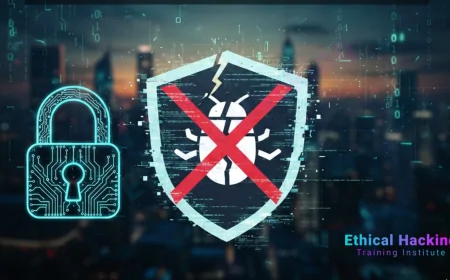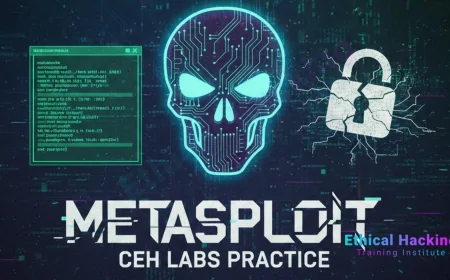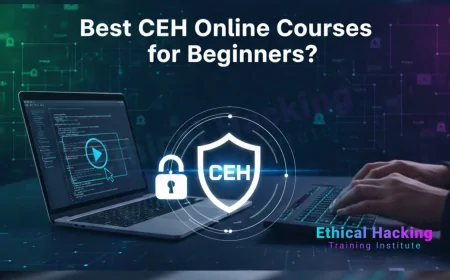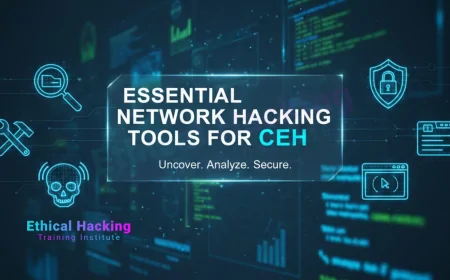What Topics Are Covered in the OSCP Course Curriculum? Full Breakdown (2025 Guide)
Explore the complete OSCP course content in 2025. Learn what topics are covered in the OSCP curriculum including exploitation, privilege escalation, web attacks, AD attacks, and more. Ideal guide for future ethical hackers and penetration testers.
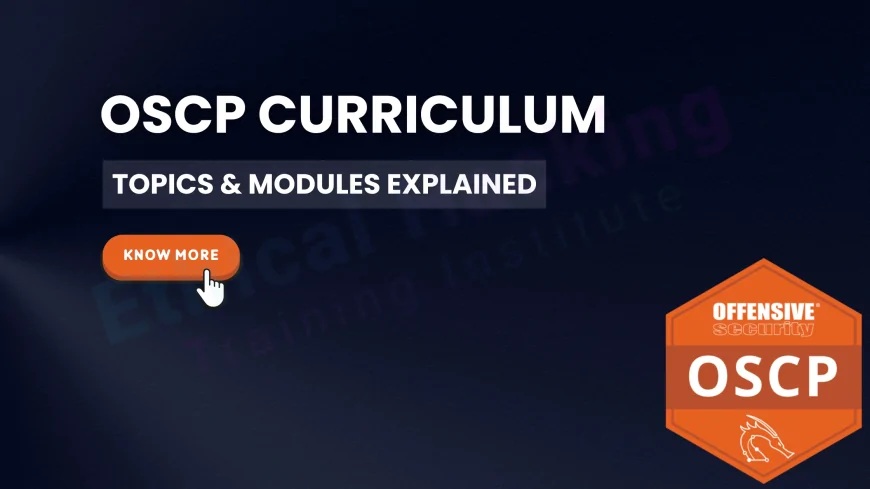
Table of Contents
- What is the OSCP Certification?
- Why is Understanding OSCP Course Content Important?
- Overview of OSCP Course Curriculum
- How is OSCP Course Delivered?
- What Tools Will You Learn in the OSCP Course?
- Who Should Take the OSCP Course?
- How Will OSCP Certification Benefit Your Career?
- OSCP Course Content and Benefits
- Conclusion
- Frequently Asked Questions (FAQs)
If you are planning to pursue the Offensive Security Certified Professional (OSCP) certification, understanding the OSCP course content is crucial. This certification is one of the most respected in the ethical hacking and penetration testing community. The course equips you with practical skills and hands-on experience to identify and exploit vulnerabilities in various systems, preparing you for real-world cybersecurity challenges.
In this blog, we will break down the OSCP curriculum topics in detail, helping you understand what knowledge and skills you will gain and how this training can boost your career in cybersecurity.
What is the OSCP Certification?
The OSCP certification is awarded by Offensive Security and is a hands-on penetration testing certification that requires students to demonstrate the ability to identify, exploit, and mitigate security vulnerabilities. It is recognized worldwide and is highly valued by employers hiring penetration testers and cybersecurity analysts.
Why is Understanding OSCP Course Content Important?
Knowing the course content helps you:
-
Prepare mentally and technically for the training and exam
-
Identify the areas where you need to focus more
-
Assess the value of the course before enrolling
-
Understand how the course can improve your career prospects
Overview of OSCP Course Curriculum
The OSCP training course, also known as Penetration Testing with Kali Linux (PWK), covers a wide range of topics that build your foundation in ethical hacking. The curriculum emphasizes hands-on exercises and real-world scenarios.
Here is a detailed breakdown of the core topics covered:
| Module | Topics Covered | Skills Gained |
|---|---|---|
| Introduction to Penetration Testing | Fundamentals of penetration testing, methodologies, legal issues | Understanding ethical hacking scope and legal boundaries |
| Kali Linux Basics | Installation, basic Linux commands, tool overview | Using Kali Linux as a penetration testing platform |
| Information Gathering | Network scanning, enumeration techniques, reconnaissance | Identifying target systems and collecting valuable data |
| Vulnerability Scanning | Automated scanning tools, manual vulnerability discovery | Detecting system weaknesses and security flaws |
| Buffer Overflows | Basics of buffer overflow attacks, exploitation techniques | Exploiting memory corruption vulnerabilities |
| Exploitation Techniques | Using Metasploit framework, manual exploit development | Gaining unauthorized access to systems |
| Privilege Escalation | Linux and Windows privilege escalation methods | Elevating access rights to administrative level |
| Client-Side Attacks | Social engineering, phishing, browser exploits | Attacking through user interaction vulnerabilities |
| Web Application Attacks | SQL Injection, Cross-Site Scripting (XSS), file inclusion | Exploiting common web vulnerabilities |
| Password Attacks | Brute force, dictionary attacks, password cracking tools | Cracking user credentials for access |
| Port Redirection and Tunneling | SSH tunneling, port forwarding | Maintaining access and bypassing firewalls |
| Active Directory Attacks | Basics of AD, enumeration, attacks | Exploiting Windows domain environments |
| Reporting | Writing professional penetration test reports | Documenting findings for clients or employers |
How is OSCP Course Delivered?
The OSCP course is mostly self-paced, offering:
-
Comprehensive PDF course materials
-
Access to a dedicated lab environment with multiple vulnerable machines for practice
-
Video tutorials explaining complex concepts
-
Community forums and support
This hands-on approach ensures you get real experience rather than just theoretical knowledge.
What Tools Will You Learn in the OSCP Course?
During the OSCP training, you will use a variety of cybersecurity tools, including but not limited to:
-
Kali Linux tools: Nmap, Netcat, Wireshark
-
Metasploit Framework for exploit development
-
Burp Suite for web application testing
-
John the Ripper for password cracking
-
Netcat for network debugging and tunneling
These tools are industry-standard and will help you gain practical skills highly sought after by employers.
Who Should Take the OSCP Course?
The OSCP is ideal for:
-
Aspiring penetration testers and ethical hackers
-
Network and system administrators wanting to enhance security skills
-
Security analysts looking to improve offensive security knowledge
-
IT professionals aiming for a challenging and respected certification
How Will OSCP Certification Benefit Your Career?
-
High demand: OSCP holders are sought after for cybersecurity roles.
-
Hands-on credibility: Employers value practical skills over theory.
-
Better salaries: Penetration testers with OSCP certification command competitive pay.
-
Career growth: Opens doors to advanced security roles and consulting opportunities.
OSCP Course Content and Benefits
| Aspect | Details |
|---|---|
| Course Type | Self-paced, hands-on penetration testing course |
| Certification | Offensive Security Certified Professional (OSCP) |
| Duration | Typically 3 to 6 months depending on your pace |
| Key Skills | Ethical hacking, vulnerability analysis, exploitation, report writing |
| Tools Covered | Kali Linux tools, Metasploit, Burp Suite, John the Ripper |
| Career Roles | Penetration Tester, Security Analyst, Ethical Hacker, Red Team Specialist |
| Salary Range (2025 Data) | $70,000 to $130,000 annually depending on location and experience |
Conclusion: Is OSCP Course Worth It?
The OSCP course content is designed to make you proficient in penetration testing through practical, real-world exercises. If you are serious about a career in ethical hacking, this certification provides unmatched value by enhancing your skills and employability.
For students aiming to enter the cybersecurity field, enrolling in an OSCP training program is a smart investment. With a focus on hands-on labs, up-to-date tools, and comprehensive curriculum, OSCP prepares you for the evolving challenges of cybersecurity.
FAQs
What is covered in the OSCP course?
The OSCP course covers penetration testing, buffer overflows, Linux and Windows privilege escalation, web app exploitation, Active Directory attacks, and report writing. It includes hands-on labs using tools like Metasploit and Burp Suite.
Is OSCP good for beginners?
OSCP is designed for professionals with some background in networking or Linux. Beginners can succeed with proper preparation in basic ethical hacking and system administration.
What are the prerequisites for OSCP?
Knowledge of TCP/IP, basic Linux commands, scripting (like Python or Bash), and understanding of how networks and operating systems work are essential before starting the OSCP course.
How long does it take to complete the OSCP course?
Depending on your experience, it typically takes 3 to 6 months of dedicated study and practice to complete the OSCP course and be exam-ready.
What is PWK in OSCP?
PWK stands for “Penetration Testing with Kali Linux,” which is the official training course for OSCP certification provided by Offensive Security.
What tools are used in OSCP training?
Common tools include Kali Linux, Metasploit, Nmap, Wireshark, Burp Suite, Netcat, John the Ripper, and custom scripts for enumeration and exploitation.
Does the OSCP course include real-world labs?
Yes, OSCP offers a dedicated lab environment simulating real-world networks where students can practice hacking multiple machines.
What is the OSCP exam format?
The OSCP exam is a 24-hour practical test where candidates must exploit multiple machines and write a comprehensive penetration testing report.
Can I take the OSCP exam online?
Yes, the OSCP exam is remotely proctored and can be taken online from a secure environment with webcam monitoring.
What certifications are similar to OSCP?
Other certifications include CEH (Certified Ethical Hacker), PNPT (Practical Network Penetration Tester), and CPENT (Certified Penetration Testing Professional), but OSCP is considered more hands-on and rigorous.
Is CEH easier than OSCP?
Yes, CEH is more theoretical, while OSCP is deeply practical and often considered more difficult due to its hands-on exam.
Is OSCP a red team certification?
OSCP covers red team-style skills like active exploitation and post-exploitation, but full red teaming involves additional tactics, which may be covered in advanced courses like OSEP or CRTP.
What jobs can I get with OSCP certification?
You can become a Penetration Tester, Red Team Analyst, SOC Analyst, Cybersecurity Engineer, or Ethical Hacker with OSCP certification.
What is the salary after OSCP certification?
According to 2025 data, OSCP-certified professionals earn between ₹8 LPA to ₹25 LPA in India and $70,000 to $130,000 internationally, depending on experience and location.
Is OSCP worth it in 2025?
Yes, OSCP remains one of the most respected and job-relevant certifications in ethical hacking and cybersecurity, with growing demand from employers.
What is Active Directory exploitation in OSCP?
It refers to attacking Microsoft AD environments by enumerating users, exploiting weak configurations, and escalating privileges within domain networks.
Do I need to know Python for OSCP?
Basic scripting in Python or Bash is helpful for exploit development and automation, but it's not mandatory for success in the OSCP course.
How practical is OSCP training?
OSCP is entirely hands-on. You’ll exploit real systems in labs, simulate network attacks, and submit a report, mimicking real-world pen testing.
Does OSCP provide placement support?
Training institutes like WebAsha offer placement support, interview prep, and project-based learning to help OSCP candidates get hired.
Can I do OSCP after CEH?
Yes, many professionals take OSCP after CEH as a next step because OSCP provides a deeper, more practical penetration testing experience.
How many machines are in the OSCP lab?
The PWK lab typically includes over 50+ vulnerable machines across multiple networks, designed to challenge and build real-world skills.
What operating systems are tested in OSCP?
The OSCP lab and exam include Windows and Linux systems with various configurations and vulnerabilities to test against.
How do I prepare for the OSCP exam?
Practice in the lab, study all course modules, simulate exam scenarios, and focus on privilege escalation, buffer overflows, and web exploits.
What is the OSCP report format?
You need to document all exploited machines, methods used, and remediation steps. A formal penetration testing report is required after the exam.
Is the OSCP exam open book?
Yes, candidates can refer to their own notes, course materials, and any personal documentation but not search the internet during the exam.
Does OSCP expire?
No, OSCP certification currently does not expire, though keeping skills updated is essential in cybersecurity.
Is OSCP good for freelancing?
Yes, OSCP enhances your credibility as a freelance penetration tester and opens up remote consulting and bug bounty opportunities.
Can students take OSCP?
Yes, students with a background in networking, Linux, or computer science can take OSCP, especially those looking to build a cybersecurity career.
Which institute offers OSCP training in Pune?
Institutes like Ethical Hacking Institute in Pune provide OSCP-focused training with labs, mentorship, and placement assistance.
What's Your Reaction?
 Like
0
Like
0
 Dislike
0
Dislike
0
 Love
0
Love
0
 Funny
0
Funny
0
 Angry
0
Angry
0
 Sad
0
Sad
0
 Wow
0
Wow
0
